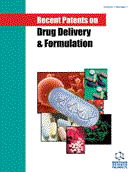Abstract
Typically, chemotherapy has been dominated by intravenous administration. Though, inclination towards oral ingestion of chemotherapeutics is increasing since it offers ample of fascinating opportunities including better quality of life, treatment advantages and low healthcare cost. However, low or moderate bioavailability along with significant inter-patient variability and narrow therapeutic window challenges their oral administration. Thus, optimization of oral route with maximized efficacy and miniminal adverse events is a challenging area. To surmount the challenges, a number of strategies like P-glycoprotein (P-gp) modulation, colloidal carrier etc. have been under investigation and scientists are exploring the utility of solid dispersions, prodrugs, biconjugates, complexes, microparticulate, and nanoparticulate systems (liposome, SLN, dendrimers, SEDDS, nanoparticles). Among these, nanoparticulate systems have shown promising results due to their targeting potential and ability to alter absorption pathways. Functional excipients with P-gp modulating activity are also being explored for more effective oral delivery of chemotherapeutics. This article explores the encouraging reports, recent patents and inventions on the feasibility and applicability of oral administration of chemotherapeutics.
Keywords: Anticancer agent, biconjugates, functional excipients, oral delivery, microparticulate system, nanoparticulate system, patent survey, P-gp modulators, prodrugs.
 68
68 3
3














